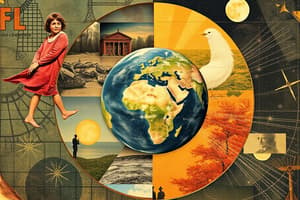Podcast
Questions and Answers
What does Budhia's initial reaction to Jaada's arrival reveal about her character and how she interacts with the seasons?
What does Budhia's initial reaction to Jaada's arrival reveal about her character and how she interacts with the seasons?
Budhia's initial shivering but subsequent welcoming attitude shows her polite and kind nature; she treats each season with respect despite any discomfort.
Contrast the descriptions of Jaada, Garmi, and Barsaat, focusing on how their appearances reflect their respective seasons.
Contrast the descriptions of Jaada, Garmi, and Barsaat, focusing on how their appearances reflect their respective seasons.
Jaada is depicted with white beard and warm clothes which is associated with coldness, Garmi in colourful attire signifying heat and brightness, and Barsaat with water droplets reflecting the essence of rain.
How does Budhia adapt her praises for each season to highlight its unique benefits, and what does this reveal about her perspective?
How does Budhia adapt her praises for each season to highlight its unique benefits, and what does this reveal about her perspective?
Budhia emphasizes season-specific benefits (warm drinks for Jaada, cool drinks for Garmi, and swings for Barsaat) demonstrating her ability to find value in every circumstance.
Explain the significance of the Ashrafis (gold coins) given by each season. What do they symbolize?
Explain the significance of the Ashrafis (gold coins) given by each season. What do they symbolize?
Why does the neighbor become jealous of Budhia, and what does this jealousy reveal about her character?
Why does the neighbor become jealous of Budhia, and what does this jealousy reveal about her character?
How does the neighbor's description of each season reflect her overall attitude?, and why is it different from Budhia's?
How does the neighbor's description of each season reflect her overall attitude?, and why is it different from Budhia's?
Describe the consequences the neighbor faces after insulting each season. What do these punishments symbolize?
Describe the consequences the neighbor faces after insulting each season. What do these punishments symbolize?
In what ways does the story suggest that the seasons themselves are sentient or possess human-like qualities?
In what ways does the story suggest that the seasons themselves are sentient or possess human-like qualities?
Compare and contrast Budhia's and the neighbor's motivations in their interactions with the seasons. What drives their actions?
Compare and contrast Budhia's and the neighbor's motivations in their interactions with the seasons. What drives their actions?
How does the absence of other humans in Budhia's life contribute to the story's message?
How does the absence of other humans in Budhia's life contribute to the story's message?
What is the central moral or lesson of the story, and how is it conveyed through the experiences of Budhia and the neighbor?
What is the central moral or lesson of the story, and how is it conveyed through the experiences of Budhia and the neighbor?
How does the setting of the jungle affect the events and overall tone of the story?
How does the setting of the jungle affect the events and overall tone of the story?
Explain how the story uses personification to make the seasons more relatable and to convey deeper meanings.
Explain how the story uses personification to make the seasons more relatable and to convey deeper meanings.
Analyze the role of dialogue in the story., and how does it reveal the characters' true natures and motivations?
Analyze the role of dialogue in the story., and how does it reveal the characters' true natures and motivations?
Budhia gives praises to each season. Why is this an important element of the story?
Budhia gives praises to each season. Why is this an important element of the story?
What does the neighbor's attempt to imitate Budhia reveal about her understanding of how to achieve happiness or success?
What does the neighbor's attempt to imitate Budhia reveal about her understanding of how to achieve happiness or success?
Consider the significance of the specific gifts (Ashrafis) given by each season. What does this tell us about the relationship between nature and human attitude?
Consider the significance of the specific gifts (Ashrafis) given by each season. What does this tell us about the relationship between nature and human attitude?
Can you propose an alternative ending where the neighbor learns from her mistakes? What changes would need to occur in her character and actions?
Can you propose an alternative ending where the neighbor learns from her mistakes? What changes would need to occur in her character and actions?
What elements would you change in the story to make it more relevant to a modern audience?
What elements would you change in the story to make it more relevant to a modern audience?
How would the story change if the setting was a bustling city instead of a secluded jungle?
How would the story change if the setting was a bustling city instead of a secluded jungle?
Flashcards
Who is Jaada?
Who is Jaada?
Winter, described as fair with a white beard, who values positive feedback.
Who is Garmi?
Who is Garmi?
Summer, appearing graceful and colorful, and rewards praise.
Who is Barsaat?
Who is Barsaat?
Monsoon season, glowing with water droplets and appreciates kind words.
Who is Budhia?
Who is Budhia?
Signup and view all the flashcards
What did Budhia say about Jaada (winter)?
What did Budhia say about Jaada (winter)?
Signup and view all the flashcards
What did Budhia say about Garmi (summer)?
What did Budhia say about Garmi (summer)?
Signup and view all the flashcards
What did Budhia say about Barsaat (monsoon)?
What did Budhia say about Barsaat (monsoon)?
Signup and view all the flashcards
How do the seasons react to criticism?
How do the seasons react to criticism?
Signup and view all the flashcards
What happens when the neighbor insults Jaada?
What happens when the neighbor insults Jaada?
Signup and view all the flashcards
What happens when the neighbor insults Garmi?
What happens when the neighbor insults Garmi?
Signup and view all the flashcards
What happens when the neighbor insults Barsaat?
What happens when the neighbor insults Barsaat?
Signup and view all the flashcards
What is the moral of the story?
What is the moral of the story?
Signup and view all the flashcards
Who is the neighbor?
Who is the neighbor?
Signup and view all the flashcards
How did Budhia become wealthy?
How did Budhia become wealthy?
Signup and view all the flashcards
What did the neighbor say about Jaada?
What did the neighbor say about Jaada?
Signup and view all the flashcards
What did the neighbor say about Garmi?
What did the neighbor say about Garmi?
Signup and view all the flashcards
What did the neighbor say about Barsaat?
What did the neighbor say about Barsaat?
Signup and view all the flashcards
What is the consequence of a bad attitude?
What is the consequence of a bad attitude?
Signup and view all the flashcards
What happens to kind people?
What happens to kind people?
Signup and view all the flashcards
What happens to those with bad intentions?
What happens to those with bad intentions?
Signup and view all the flashcards
Study Notes
Story Overview
- A tale about an old woman (Budhia) in a jungle where humans or living beings are absent.
- Jaada (winter), Garmi (summer), and Barsaat (rain) argue about who is the best season.
- They decide to ask the old woman for her opinion.
Jaada's Visit
- Jaada is described with a fair complexion, white beard, and covered in warm clothes.
- Budhia shivers upon Jaada's arrival and asks him to stand in the sun.
- Jaada asks Budhia for her opinion on winter's quality.
- Budhia praises winter, describing it as a time of comfort, warm drinks, delicious foods, and rosy cheeks.
- Jaada is pleased with her answer, gives her 1000 gold coins (Ashrafis), and promises more in the next winter.
Garmi's Visit
- Garmi arrives gracefully dressed in colorful attire and jewelry.
- She asks Budhia her opinion on summer.
- Budhia praises summer, describing it as a time for cool drinks, white clothes, refreshing baths, and a season of ripening fruits.
- Garmi is delighted, gives Budhia 1000 Ashrafis, and promises more every year for her kind words.
Barsaat's Visit
- Barsaat appears graceful and glowing with water droplets.
- Barsaat asks Budhia about the monsoon season
- Budhia praises the monsoon season, mentioning rain showers, swings in gardens, women wearing green bangles with henna-adorned hands, and the beauty of the cloudy sky.
- Budhia receives 1,000 Ashrafis
The Neighbor's Jealousy
- A jealous neighbor notices the Budhia's sudden wealth.
- She learns that the old woman acquired the money from Jaada, Garmi, and Barsaat.
- The neighbor resolves to get money herself
The Neighbor's Encounter with Jaada
- The seasons wonder about Budhia's verdict.
- They see the neighbor crying and decide to approach her.
- Jaada arrives and asks her for her opinion on winter.
- The neighbor insults winter, describing it as a season of ailments, discomfort, and misery.
- Jaada is angered by her response, strikes her (causing paralysis), and leaves.
The Neighbor's Encounter with Garmi
- Garmi visits the neighbor and asks for her opinion on summer.
- The neighbor berates summer, describing it as a time of excessive heat, discomfort, and disease.
- Garmi is furious, attacks the neighbor, and leaves.
The Neighbor's Encounter with Barsaat
- The neighbor awaits Barsaat with apprehension.
- Barsaat arrives and asks for her opinion on the rainy season.
- The neighbor criticizes Barsaat, describing it as a time of thunder, lightning, floods, and mosquitoes.
- Barsaat strikes her with lightning, injures her leg, spits on her face and the neighbor is left debilitated.
Moral of the Story
- Those with a pleasant nature are happy in all circumstances
- Those with a bad attitude face difficulties everywhere they go.
- Kind and agreeable people are rewarded, while those with bad intentions suffer.
Studying That Suits You
Use AI to generate personalized quizzes and flashcards to suit your learning preferences.




